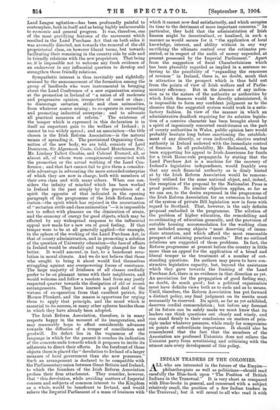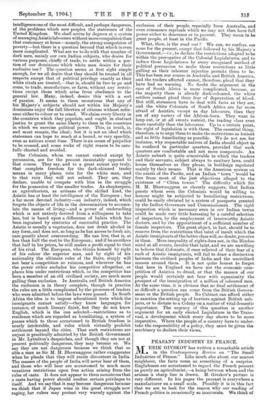philanthropists as well as politicians—should read. carefully the Blue-book upon
"The Position of British Indians in the Transvaal." It is very short as compared with Blue-books in general, and concerned with a subject relatively small, the position of a few Indian traders in the Transvaal; but it will reveal to all who read it with intelligence one of the most difficult, and perhaps dangerous, of the problems which now perplex the statesmen of the United Kingdom. We shall arrive by degrees at a system of managingAsiaticlabourers without more compulsion than that customary at home—namely, the strong compulsion of poverty—but there is a question beyond that which is even more complicated. What are we to do with that number of dark men, mainly our own Indian subjects, who desire for various purposes, chiefly of trade, to settle within a por- tion of our dominions which white men desire for their exclusive use ? The question seems at first sight simple enough, for we all desire that they should be treated in all respects except that of political privilege exactly as their white rivals are treated,—that is, should be free to go and come, to trade, manufacture, or farm, without any restric- tions except those which arise from obedience to the general law. Many, indeed, desire this with a sort of passion. It seems to them monstrous that any of his Majesty's subjects should not within his Majesty's dominions enjoy the full liberties of citizens without refer- ence either to colour or to creed. We claim every liberty in the countries which they populate, and ought in abstract justice to grant the same liberty to them in the countries in which we exercise political power. This, in truth, is, and must remain, the ideal; but it is not an ideal which statesmen can hope to reach at a bound, or very speedily, even as nations count time. There is an ocean of prejudice to be crossed, and some rocks of right reason to be care- fully charted and avoided.
The Colonists, whom we cannot control except by persuasion, are for the present immutably opposed to that course. They say, and to a great extent say truly, that complete freedom for the dark-skinned trader means in many places ruin for the white man, and to that ruin they will not submit. They are, they declare, unable to compete with him in the struggle for the possession of the smaller trades. As shopkeepers, as agriculturists, as artisans of the skilled kind, the Asiatic has at least the intelligence of the European ; has a far more devoted industry—an industry, indeed, which forgets the objects of life in the determination to accumu- late the means of Jiving—and a power of underselling which is not entirely derived from a willingness to take less, but is based upon a difference of habits which has been ingrained by centuries of successful practice. The Asiatic is usually a vegetarian, does not drink alcohol in any form, and does not, so long as he has access to fresh air, care greatly about overcrowding. He can live, that is, at less than half the cost to the European; and if he sacrifices that half in his prices, he still makes a profit equal to that of his rival. The European, who thinks himself by right of his colour the superior man, and by right of his nationality the ultimate ruler of the State, simply will not bear a competition so ruinous, and wherever he has the power either excludes his competitor altogether, or places him under restrictions which, as the competitor has been a member of an old civilised society, are much more galling than exclusion. In Australia and British America the exclusion is in theory complete, though in practice the rules are a little complicated by the presence of traders who were admitted before the laws were passed. In South Africa the idea is to impose educational tests which the immigrants cannot satisfy—they know languages, for instance, of much literary finish, but they do not know English, which is the one selected—restrictions as to residence which are regarded as humiliating, a system of passes which to those accustomed to British freedom is nearly intolerable, and rules which virtually prohibit settlement beyond the cities. That such restrictions are unjust is practically admitted by the British Government in Mr. Lyttelton's despatches, and though they are not at present politically dangerous, they may become so. We say they are not dangerous because we think that so able a man as Sir M. M. Bhownaggree rather exaggerates whei he pleads that they will excite discontent in India. The masses of the people of India will never hear of them, and those who will hear are accustomed to much more vexatious restrictions upon free action arising from the rules of caste. It does not appear to them monstrous that a caste having power should confine certain privileges to itself. And we say that it may become dangerous because we think that if Japan wins in the great struggle now raging, her rulers may protest very warmly against the exclusion of their people, especially from Australia, and even commence reprisals which we may not then have full power either to denounce or to prevent. They mean to be great people, at least in the Pacific.
What, then, is the road out ? We can, we confess, see none for the present, except that followed by his Majesty's Government,—i.e., to declare the restrictions adopted to be within the prerogative of the Colonial Legislatures, and to induce those Legislatures by every recognised method of political persuasion to make those restrictions as little galling as their inherent injustice permits them to be. This has been our course in Australia and British America, and the traders affected cannot, therefore, plead that they have had no warning. No doubt the argument in the case of South Africa is more complicated, because, as the majority there is already dark-coloured, the white settlers cannot plead their fear of depravation of blood. But still, statesmen have to deal with facts as they are, and the white Colonists of South Africa are far more afraid of Asiatics, except as day labourers, than they are of any variety of the African-born. They want to keep out, or at all events restridt, the trading class even more carefully than the labourers. Up to a Certain point, the right of legislation is with them. The essential thing, therefore, is to urge them to make the restrictions as lenient and as little humiliating as possible. We do not see, for instance, why respectable natives of India should object to be confined to particular quarters, provided that such quarters are comfortable and hot mere compounds. An Asiatic suburb is 'quite conceivable in which the traders and their servants, subject always to sanitary laws, could house themselves as they please, in buildings regulated mainly by their means. That is the American system on the coasts of the Pacific, and an Indian " town " would be free from most of the just objections alleged to the existence of "China towns." The difficulty which Sir M. M. Bhownaggree so cleverly suggests, that Indian guests whom even the Colonists would be willing to honour might be subjected to humiliating restrictions, could be easily obviated by a system of passports granted by the Indian Governors and Commissioners. The rigid inspection which is necessary even in our Indian towns could be made very little harassing by a careful selection of inspectors, by the employment of trustworthy Asiatic doctors, and by the appointment of a sufficient number of female inspectors. The great object, in fact, should be to remove from the restrictions that taint of insult which the Asiatic immigrants of the better class will, no doubt, perceive in them. Mere inequality of rights does not, in the Hindoo mind at all events, involve that taint, and we are unwilling to believe that Colonists, if once relieved of their fear of a rush of Asiatic immigrants, will fail to draw a distinction between the civilised peoples of India and the uncivilised masses around them. It is not quite honest to forget that here in England we have not the economic com- petition of Asiatics to dread, or that the masses of our people would certainly not bear with equanimity the prospect of the immigration of a million of coloured men. At the same time, it is obvious that no final settlement of so difficult a question can come from the British Govern- ment or the British people. No Cabinet can afford either to sanction the setting up of barriers against British sub- jects, or to dictate to a Colony on a matter of vital domestic importance. The urgency of this question is another argument for an early elected Legislature in the Trans- vaal, a development which every day shows to be more imperative. Where the people of a country have to under- take the responsibility of a policy, they must be given the machinery to declare their views.
PEASANT INDUSTRY IN FRANCE.







































 Previous page
Previous page